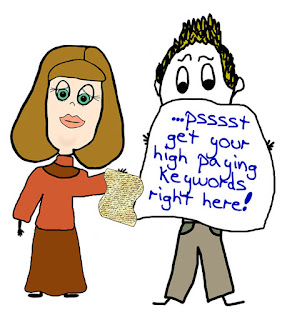WHAT? Yes, it's true. Not only does spending time playing around with keyword values waste time, it's unlikely to result in higher paying CPCs. And there isn't any one single reason that it's true, but multiple reasons.
Hundreds of blogs write lists of these mythical keywords ... they're pretty useless, unless of course you're looking for humour. Even as far back as
2006, there were smart publishers out there who understood what was and what wasn't true about these mythical beasts.
Raise your hand if you've done it ... gone looking at lists of high paying keywords?
Yep, just what I thought. An awful lot of you have, especially the ones new to the world of advertising revenue. That isn't surprising actually. There are a plethora of unauthoritative blogs out there eschewing the greatness of using high paying keywords but the truth is ... that's a fallacy (ie: untruth, fib, lie).
Oh sure, maybe way back near the beginning of the online advertising word, these keywords were useful but in the early days, advertisers didn't have as much information, data, and knowledge available to them as they do today. Now, advertisers are a lot less willing to waste their money advertising where it doesn't count (or, put another way, a lot smarter about how they spend their advertising dollars).

Today, keyword tools can still be useful in helping you with your own website - making sure you've got a good match between the contents on your site, and the keywords your site ranks for in serps, but otherwise, they probably aren't going to help you make more money. You certainly won't make $50 for a click just because your website has the keyword which supposedly pays that much.
What's most important in determining what to write about is not keywords, or what their value is.
When it comes to determining the actual CPC on an ad, many factors are involved, but the content itself is critical.
Now we come to why keywords make a lot less difference than you might think when it comes to how much you'll earn.
Keyword ToolsHow AdSense determines CPC for ads on a publisher's website isn't from the figures seen in the AdWords Keyword Planner. Those values are "suggested" values for
advertisers to BID to get their ads to show up on Google's own search results pages, and have nothing to do with what a publisher would get paid for ads on their website. The Publisher Network is different than the Search Network. In other words if you own Google.com, you might be able to get paid $50 for a click on some ad, but if you own joestechsite.whatever, you're more likely to get a couple of cents for a click on an ad.
The keyword planner won't help publishers get paid more. It can be useful to see how popular certain keywords or phrases might be for the content on your site, and whether or not you've left off some, but you won't get paid what that tool shows as a bid price.
The tool shows relevant keywords for your site, and the average number of searches for those keywords in a month, and the level of competition for those keywords, along with a suggested bid price. All of these are used by the advertisers. That's what the tool was designed for. If an advertiser wants to purchase ads, it's helpful to know a little something about the competition in search results for those keywords, and also to know how much they might have to bid.
This has nothing to do with what you get paid because what an advertiser bids, isn't necessarily what the advertiser will have to pay. Are you getting it yet? The tools is for advertisers on Google's search pages, not your website. But, we aren't here to discuss AdWords. That would take an entire post of it's own. The point is the keyword tool is for advertisers.
Ad Targeting & CPC
AdSense ads are targeted to a site in several different ways. overall site keywords; interest based advertising; placement targeted ads; geographically targeted ads; language targeting.
Interest Based Advertising is targeted to visitor interests and previous search/surfing habits. What that means for a publisher is even though your site might be about fashion trends, visitors to your site might get ads for cell phones, or frying pans. Or, like some publishers ... you might have spent a lot of time checking into high paying keywords (the myth) and creating a site about car insurance ... only to find your clicks are earning you about 3 or 5 cents, instead of the $20 you expected.

That's partly because your visitors might not be seeing ads for insurance, but ads for things that interest them, like the latest cell phone, or ads for dog collars and leashes. That's what IBAs are all about. Presenting ads to visitors based on what
THEY are interested in because the visitor is more likely to click an ad like that. (And might also be partly because of "smart-pricing - more on that later.)
All that work looking up high paying keywords resulted in ... not getting the payment you expected.
That doesn't mean you wouldn't sometimes get insurance ads, but even if you do, you still won't get $20 per click.
You can turn off interest based ads in your AdSense dashboard under allow & block ads, but unless a visitor has also opted their browser out of the IBA cookies, they're still going to see interest based ads. Several things you'll want to read about ad targeting can be found in the AdSense help center, which if you took time to read before doing all that keyword research, you probably wouldn't have wasted your time with the keywords.
Smart Pricing
Lots of clicks on your ads does not always equal advertiser confidence, nor does it mean you would get anything even remotely close to what an advertiser bid for a click on the ad.
Smart Pricing is designed to ensure the advertiser gets some sort of return on investment (ROI = the value the advertiser received for paying for the click).
If you get lots of clicks, but advertisers aren't seeing much (or any) value in the visitor you sent to them (ie: the advertiser is looking for a sign-up, or for subscribers or for a product purchase and none of that happens), then you could find that smart pricing is turning your "high paying keywords" into 1 cent clicks.
Since the smart pricing is not determined for a whole website, or on an entire account basis, but on the click itself, smart pricing doesn't mean "all" your clicks are smart-priced. If a lot of clicks are from people who only click the ad because they want to help you out a little (which is not the purpose of adsense) and really don't have any interest in the advertiser at all, that click could turn out to be very low paying, even if it was on an ad for what someone "perceives" to be a high-paying niche. To quote AdSense directly:
"To appear on AdSense content pages, AdWords advertisers bid on ads and compete in an auction to appear on your pages. When advertisers compete to appear on AdSense for content pages, they're looking for business results from their clicks. These results differ from advertiser to advertiser, but could range from an online purchase to a newsletter sign-up. To ensure that advertisers are getting value from their bids on AdSense sites, we determine how likely a click is to lead to a business result for an advertiser. If our system determines that a click is less likely to lead to a business result, the advertiser's maximum bid may be reduced."
Smart pricing is a little more complicated than that, but the fact that it exists to help the advertiser means it has an affect on how much you might earn.
If all your clicks end up being smart priced, you could earn very little, even from thousands of clicks. On the other hand, if you have a lot less clicks, but most of them are made out of true interest in the advertiser's products or services you could earn a lot more from a lot less clicks. So more clicks does not always = more earnings.
What's the Point?The point I am slowly trying to make is this. I encourage you to write about whatever things you are passionate about, regardless of what value the keyword has. A keyword has no value at all if someone doesn't click the ad.
When you write with passion; when you write from your own experience and with your own feelings, you produce real content - better content! And better content that's not like anyone else's is worth a lot more to advertisers than 10,000 similar articles about cell phones or how to make money online.
By writing from your own experience, what you're giving to your audience is part of yourself. It's entirely unique because it's you - it's your feelings, your expressions, your likes and dislikes. And unique content gives the advertiser a good reason to pay good values to appear on your site, and can also entice an advertiser to target ad placements (see placement targeting above) specifically to your site.
That's less likely to happen on websites with the same articles found on other sites, or articles re-written from someone else's content. And just to show you that I follow my own advice, one of my own websites is in a fairly low-paying niche (free stock photos and images for blogs), but because all the images I create are unique, and I write articles there as well ... I've seen clicks that range in price to $5 on that site, and I've got ads that are placement targeted to my site.
A low paying niche can earn as much as a higher paying niche if the content created is unique and original, and let's not forget that IBAs mean the ads shown can be from many different niches.
Summary1. Don't waste time trying to write for high paying keywords. That's a myth.
2. Use keyword tools to help ensure your site contents are using keywords relevant to your content instead of using them to look up false values.

3. Don't use keyword tools to decide what to write about. Write what you love instead.
4. Don't use software, tools, link sites, or traffic generating sites to get useless traffic. Grow your audience naturally.
5. Don't waste time trying to write for high paying keywords.
Yeah, I know ... I said that twice. But I suspect that if I said it 100 times, some people still wouldn't believe it. That's their loss.
Hopefully, the smart people out there will finally get it, and stop writing about using something that simply doesn't work for publishers any longer.
posted by J. Gracey Stinson
 Many have had a tough time with Adsense this past year - there have been a lot of changes to how AdSense works; changes to how your dashboards look; and even changes to the help forum platform. We've been attacked by bots, and redirecting ads, had to add EU-cookie compliance, and some have even had to deal with hacked accounts. This is probably one of the toughest years I've had, just like a lot of you.
Many have had a tough time with Adsense this past year - there have been a lot of changes to how AdSense works; changes to how your dashboards look; and even changes to the help forum platform. We've been attacked by bots, and redirecting ads, had to add EU-cookie compliance, and some have even had to deal with hacked accounts. This is probably one of the toughest years I've had, just like a lot of you.




























